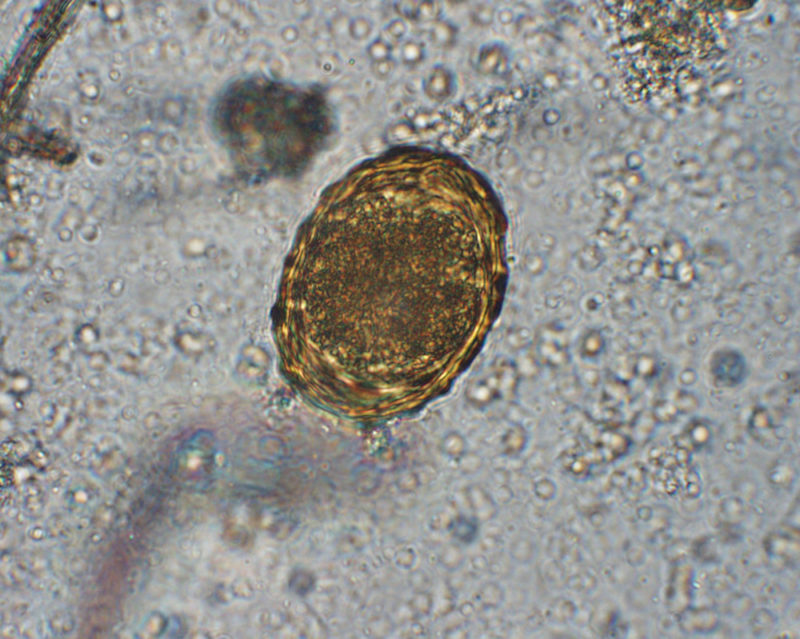

Veterinary Review Initiative
This resource has been reviewed for accuracy and clarity by a qualified Doctor of Veterinary Medicine as of January 2023.
Check out more information on our Veterinary Review Initiative here!
The average person may be a bit grossed out by poop, but many long-time caregivers are not only unfazed by the presence of (non-human animal) poop, they also observe it with interest because they know it can provide clues about an individual’s health. Paying attention to your residents’ poop and watching for changes in color, consistency, or smell can certainly alert you to when something is amiss, but your resident’s poop holds other information about their health that can only be revealed through diagnostic testing. In general, fecal testing comes up most often as a tool to detect internal parasites. As such, that will be the focus of this resource. However, fecal samples can reveal more than parasitic infection, so we’ll also highlight other ways your veterinarian may utilize fecal testing.
Before we dive in, it’s important to stress that while fecal testing can play an important role in diagnosing or monitoring certain conditions, it is just one piece of the puzzle. Different situations are going to require a different set of tools, which may include combining fecal testing with other diagnostic tests or a veterinary examination. The person best equipped to identify the most appropriate combination of tools for each specific case will be your veterinarian. Veterinarians comprehensively look at many factors (environment, age, breed, species, physical exam, diet, diagnostic tests) to make recommendations and treatment plans.
Fecal Testing For Internal Parasites
As mentioned above, fecal testing comes up most often as a tool to detect internal parasites. However, it is important to recognize that not all internal parasites can be diagnosed via fecal testing. Therefore, it is crucial that you work closely with your veterinarian to determine if and when fecal testing is appropriate.
Fecal testing for parasite detection is typically conducted for one of the following reasons:
- To assist with diagnosis when an individual is showing clinical signs of certain parasitic diseases
- To screen new residents for internal parasitic infection as part of the intake process
- To assess the efficacy of an antiparasitic treatment by comparing pre- and post-treatment results
- To identify which internal parasites your residents are harboring and/or to monitor parasite loads through routine fecal testing of individuals who are not showing clinical signs of parasitism
- To ensure the right internal parasite(s) are being targeted with medications versus using broad-spectrum anthelmintics or antimicrobials that may promote resistance (to learn more about antimicrobial and anthelmintic resistance, check out our resource here)

There are various techniques that can be used to detect internal parasites in a fecal sample, each with its own indications and limitations. Some tests look for parasite “eggs,” while others detect actual larvae. Fecal floatation (of which there are different techniques) is commonly used and can detect most, but not all, intestinal parasites. This test primarily detects parasite eggs in a fecal sample. However, while many parasites produce eggs that are passed in the host’s feces, some parasites pass as free larvae instead. Therefore, to test for these parasites, a different test may be more appropriate. For example, if you want to test for lungworm, the Baerman technique, rather than a fecal float, is often advised. We recommend working with your veterinarian (and, if necessary, the diagnostic lab) to determine the most appropriate testing method(s) based on the resident’s species and the situation.
Interpreting Results
If no parasites are found in a sample, does that mean the individual is definitely free of internal parasites? And if parasites are found, does that automatically mean that treatment is necessary and appropriate? While it would certainly be easier if both these questions could be answered with a definitive “yes,” unfortunately, it’s not quite that straightforward. First, let’s look at what a negative result (i.e. no parasites detected) might mean.
No Parasites Detected
As we mentioned earlier in the resource, fecal testing is not an appropriate tool to diagnose all internal parasites. Unfortunately, even for internal parasites that can technically be detected in a fecal sample, diagnosis is not always easy. This is yet another reason why you should work with your veterinarian both to determine the most appropriate diagnostic tests to have performed and also to have results interpreted, taking the individual’s age, species, clinical signs, risk of exposure, etc. into consideration.
There are multiple reasons that an individual might receive a negative result despite harboring parasites. These include the following:
- The parasitic infection is still in the early stages before it can be diagnosed via fecal testing. “Early” is a relative term. Some parasites can take months before being detectable, while others will be detectable much sooner than this. Your veterinarian can make specific recommendations regarding the timing of fecal tests (and, in some cases, follow-up testing) based on the parasite(s) of concern. The specific parasites of concern at your sanctuary will depend on various factors. We recommend working with your veterinarian to familiarize yourself with the parasites of concern in your area based on the species for whom you care.
- At the time the fecal sample was collected, the parasites were in a state of arrested development (hypobiosis). Fecal results during this time will not be reflective of how many parasites are actually inside the host. Your veterinarian can make recommendations about when to test (or retest) to account for this arrested state of development, if applicable.
- The number of parasites inside the individual is too low to detect via fecal testing. Unfortunately, low counts do not always correlate to low risk of illness. While some parasites can be present in relatively large numbers before causing serious damage, other parasites can be detrimental when only a few (or even just one!) are present. Therefore, if your veterinarian suspects a parasitic infection that is detrimental at low levels, they may recommend treatment based on clinical signs alone.
- The individual is harboring a parasite that produces very small numbers of eggs, making detection with just a single test unreliable. Your veterinarian may recommend follow-up testing and/or, as mentioned above, may recommend treatment based on clinical signs alone, depending on the situation.
- The individual is harboring a parasite that cannot be reliably detected with the testing method that was used. As mentioned above, your veterinarian can make recommendations regarding the most appropriate testing methods, or they can connect with the diagnostic lab for guidance. In the case of a parasite that simply cannot be detected via fecal testing, your veterinarian can recommend other diagnostic tools, if available, or they may make treatment recommendations based on clinical signs and risk of exposure.
Given the above possibilities, it’s important to work with your veterinarian to determine whether or not further diagnostics are advised. If one of your residents is clearly sick and showing signs of a particular parasitic infection, your veterinarian may recommend treatment despite a seemingly negative result.
Parasites Detected
Qualitative vs. Quantitative Analysis
In some cases, you may have a choice between a qualitative fecal analysis and a quantitative fecal analysis. Other times, the lab may default to qualitative or quantitative unless you request otherwise. In order to make the most of fecal testing, it’s important to understand the difference between these two analyses. Qualitative analysis will identify the parasite found (if any), but will not give you an indication of how many parasites the individual has. A quantitative analysis will give you an actual count per gram of feces.
As we alluded to above, even if parasites are detected, the decision of whether or not to treat is not always straightforward. Because of this, we recommend you work with your veterinarian to make treatment decisions and/or, if appropriate, to establish treatment protocols (i.e. for parasite A, if levels are above X, always treat with __________). Some parasites are normal inhabitants of an animal’s intestinal tract at certain levels, and others cause a problem when they reach a certain threshold. While you can buy antiparasitic treatments at your local farm supply store or through an online retailer without a prescription, you should still work closely with your veterinarian to ensure the treatment is used appropriately. Additionally, in some cases, extra-labelExtra-label use means that a drug is used in a way other than what is described on the label or package insert. If a drug is used in a different species than what it has been approved for, this is extra-label use. Other examples include using a drug to treat a different condition than it is approved for or administering it in a different way than the directions describe. Extra-label drug use can only occur within the confines of a valid veterinarian-client-patient relationship. use of drugs may be required, and this can only occur within the confines of a valid veterinarian-client-patient relationship.
Drug Resistance
While drug resistance often comes up in terms of antibiotic resistance, parasites can also develop resistance to treatment. Depending on the parasite in question, drug resistance may be a major concern that impacts how and when individuals are treated for parasitic infections. Not only can it impact treatment of that particular parasitic infection, it can also affect how other parasitic infections are treated as well, in order to limit the use of certain drugs (in an effort to maintain the drug’s efficacy).
We recommend talking with your veterinarian about post-treatment testing in order to assess whether or not the treatment was effective. In the case that it was not effective, work with your veterinarian to determine the potential cause, which (besides resistance) could include things like improper administration of the drug, under-dosing, improper storage of the drug, use of expired drugs, or using a drug that is not effective against the parasite in question.
It’s Not Just About Parasites
While fecal testing plays an essential role in the detection of many internal parasites, fecal testing can also be used to diagnose (or aid in the diagnosis of) other issues as well. This includes (but is not limited to) checking for other organisms, such as bacteria, viruses, or yeast or checking for blood in feces that cannot be detected with the naked eye. Your veterinarian may recommend specific fecal tests to screen residents for certain diseases, and in the case of an individual showing signs of concern, they may recommend specific fecal tests to help make a diagnosis.
Collection And Storage Of Fecal Samples
To ensure the most accurate results and the most efficient use of your budget, you’ll need to know the following:

- How to properly collect the sample based on the test(s) requested
- How much feces is required in order to perform the necessary test(s)
- How to properly store the sample
- How quickly the sample must be submitted for testing
Because different tests have different requirements in terms of the above information, it’s best to check in with your veterinarian or the diagnostic lab for guidance.
Recordkeeping
We recommend always asking your veterinarian for a copy of all diagnostic results so that you can include them in your residents’ records. It’s also important to take thorough notes about their interpretation of those results. In the case of parasite detection, also include notes about any treatment that was administered and, if it was, be sure also to include post-treatment results and a note about whether or not the treatment was effective.
Fecal testing can play an important role in monitoring resident health and diagnosing disease, but it’s imperative that you have a good relationship with an experienced veterinarian so that you can make the most of this diagnostic tool. While we hope this resource has given you a basic understanding of how this tool is used, your veterinarian is going to be your best resource when it comes to assessing your residents’ health, recommending the most appropriate diagnostics, and making sense of results.
SOURCES:
Optimal Fecal Assessment | National Library Of Medicine
Fecal Floatation | VCA Animal Hospital






